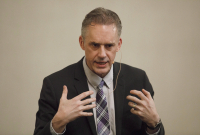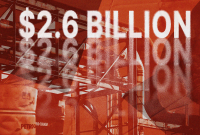Support strong Canadian climate journalism for 2025
Prime Minister Justin Trudeau is to meet one-on-one with Mexican President Andrés Manuel López Obrador today as he wraps up his time at the North American Leaders' Summit.
Trudeau begins the day with a keynote speech on the relationship between Canada and Mexico, easily the most overlooked bilateral dynamic on a continent far more seized with relations that involve the United States.
The two leaders are to sign a declaration on Indigenous co-operation before Trudeau holds a news conference before departing for Ottawa.
If Tuesday was any indication, the afternoon schedule may need to be flexible.
Trudeau and U.S. President Joe Biden stared at their feet as the famously long-winded López Obrador spent nearly 30 minutes answering a single question during a marathon news conference at the National Palace in Mexico City.
Speaking entirely in Spanish, he acknowledged at one point that he'd been talking for too long — and when he was done, Biden wasted no time wrapping things up.
"For the record, I don't know what questions I didn't answer," the U.S. president said before decamping for Air Force 1 and a prompt return to the White House.
One of those questions was about Biden's own public-speaking proclivities: unapologetically touting his protectionist Buy American doctrine to domestic audiences while singing the praises of continental co-operation internationally.
Trudeau, however, likely won't shy away from the topic Wednesday, having raised it directly with the U.S. president in their own bilateral meeting the day before.
Trudeau and Biden wrapped up a pair of their own loose ends on Tuesday, including a workaround for the imperilled Nexus trusted-traveller program and a schedule for the president's long-delayed first visit to Canada.
A modified form of Nexus, jointly run by the Canada Border Services Agency and U.S. Customs and Border Protection, will be up and running by the spring, said Public Safety Minister Marco Mendicino.
The changes, which include a streamlined but still separate interview process, a faster renewals process and expanded staffing levels on the U.S. side, would increase the system's ability to process Nexus applications by 50 per cent, he said.
"The demand is there because people see this as a way to accelerate their travel in a flexible, seamless and efficient way," he said. "That's precisely what the vision of this program is, so this is truly a win-win."
The system is currently dealing with a backlog of between 220,000 and 240,000 applications, he added.
The agreement will allow Canada's Nexus enrolment centres to reopen, with interviews with U.S. border agents taking place at Canadian airport facilities that already provide preclearance services for travellers heading stateside.
Nexus applicants, who must be interviewed by both Canadian and U.S. authorities, would sit down with Customs and Border Protection officials for that portion of the process before travelling to the U.S., provided they are travelling imminently and leaving from an airport where customs preclearance is an option.
International airports in Canada that offer preclearance services include those in Calgary, Edmonton, Vancouver, Halifax, Montreal, Ottawa and Winnipeg, as well as Pearson International Airport in Toronto.
The week's main trilateral event Tuesday touched on key continental issues, including collective support for Ukraine, the best way forward on gang-ravaged Haiti and the ever-present tide of irregular migration across the U.S.-Mexico border.
Canada said it would purchase a U.S.-made surface-to-air missile system to help Ukraine in its yearlong effort to fend off Russia's ongoing invasion. Defence Minister Anita Anand said the system, valued at about $406 million, comes from the additional $500 million in military aid to Ukraine that Trudeau announced in November.
But while the U.S. continued to press Canada to take a leadership role in helping to quell rampant gangs and lawlessness in Haiti, Trudeau stopped short of making any firm commitments.
"We need to continue to be there for the people of Haiti — but we need to make sure that the solutions are driven by the people of Haiti themselves," he said.
Canada has been focused on imposing sanctions on the "elites" that Trudeau blamed for the violence and political instability — "a handful of small, extraordinarily wealthy families in Haiti have been causing much of the strife because of political and pecuniary interests."
There's more to do, Trudeau added, but he wouldn't say whether that would involve the federal government green-lighting some sort of security force in the country, as the U.S. has been encouraging Canada in particular to take on.
"We're going to make sure that what we do this time allows for the Haitian people to get the situation under control. And a big part of that is putting those sanctions on the Haitian leadership that is responsible for so much of the misery."
This report by The Canadian Press was first published Jan. 11, 2023.




Comments